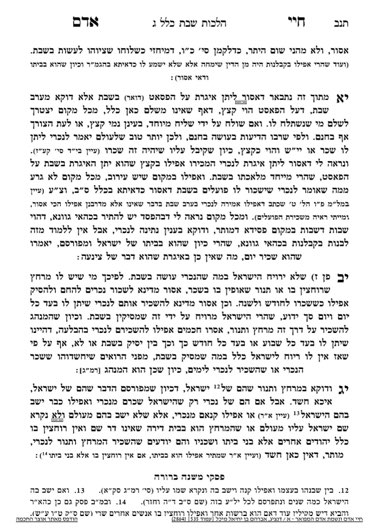MWe are beginning in siman 11. We will not learn the entire siman inside. The Chayei Adam will discuss mailing items on Shabbos.
The Chayei Adam writes that based on what we have learned, a person cannot put outgoing mail into the mail on Shabbos. Even though the mailman is a kablan, and there is a fixed price, since the expectation is that the non-Jew will pick it up on Shabbos itself, the Jew is essentially directing the non-Jew to perform the melacha on Shabbos. It is inherent in the act of putting the mail in the mailbox that the Jew is directing the non-Jew to work for him on Shabbos.
If the Jew sends the mail on Friday, and it will be processed on Shabbos, it is muttar. The mail is talush, there is a fixed price for the work, and the work is not occurring on the Jew’s premises. Taking this a step further, one can place mail in a public mailbox (not on their premises) even late on Friday afternoon, because when the non-Jew decides to pick it up on Shabbos, it is by the choice of the non-Jew and not because of any implicit or explicit directive from the Jew. One cannot put it in a public mailbox on Shabbos itself, because it is a directive to the non-Jew, as we explained above (additionally, there may be issues of muktzah).
The Chayei Adam continues, and writes that a letter where the recipient pays (known contemporarily as COD, cash on delivery) is also muttar, because even if the payment is not given until later, the arrangement is still of a kablan with a fixed price.
The Chayei Adam writes that if one uses a courier service, the courier is also a kablan, as they are paid by the job. There is also a fixed price, so it is muttar.
The Chayei Adam discusses cases in which the service is being done for free or in exchange for a favor, but these cases are not so relevant.
The Chayei Adam writes that if a Jew wants the mail to be sent on Shabbos, so he gives the mail to non-Jew A before Shabbos with instructions that the mail be given to non-Jew B, the courier, on Shabbos. In other words, the Jew is asking non-Jew A to do something (amira l’achum) which the Jew himself is not allowed to do on Shabbos. The Chayei Adam writes that this is assur, because even amira l’amira, asking one non-Jew perform amira to another non-Jew is assur.
The Chayei Adam explains that amira l’amira is assur because he is essentially asking the second non-Jew to perform melacha on Shabbos through the vehicle of the first non-Jew. And, as we know, we know that it is assur to hire workers on Shabbos, because it is a form of amira. Over there, we also learn that it is also assur to ask a non-Jew to hire worker on Shabbos. Thus, our case should be no different
Summary
One cannot place outgoing mail in a mailbox on Shabbos itself, but can place it in a mailbox late Friday afternoon even if it will not be picked up until Shabbos itself (except if it is on a Jew’s premises, in which case it must be picked up before Shabbos.
Amira l’amira is assur.



